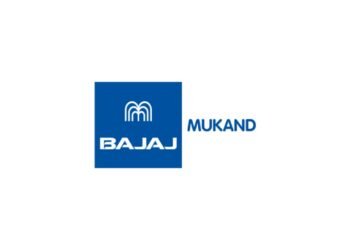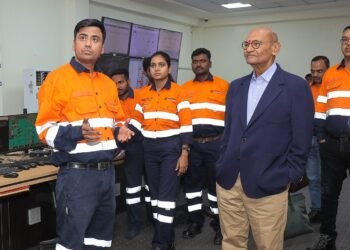BANGALORE: Three CSR projects of Reliance Foundation, CSR arm of Reliance Industries Limited, India’s largest private sector enterprise has been honoured with India CSR Community Initiative Awards (India CSR Awards) by India CSR, world’s popular CSR Newswire. India CSR organized ‘3rd Annual CSR Awards Ceremony’ on 27 August at Davanam Sarovar Portico Suites, Bengaluru, India. The event was supported by Birla Institute of Management Technology (BIMTECH) and Pehel, the CSR arm of Dainik Jagran Group.
CSR projects – Bhumitra Self Reliant Farmers Producer Company (Agriculture), Water conservation as a stimulus to rural transformation (Watershed Development), and Flag Technique – An emergency communication to reach disaster ravaged farmers CSR Documentary Film have been honoured at the gala award function.
Sudarshan Suchi, Program Head, Reliance Foundation received the honour from T. B. Jayachandra, Hon’ble Minister for Law, Parliamentary Affairs & Higher Education, Govt. of Karnataka in the presence of Dr. Bhaskar Chatterjee, DG & CEO, India Institute of Corporate Affairs (IICA); Dr. Huzaifa Khorakiwala, Trustee and CEO, Wockhardt Foundation, Ramdas Mansing Mane, CMD, Mane Group of Companies; Shri Sanjay Katkar, Joint MD, Quick Heal Technologies Limited; Rusen Kumar, Founder and Managing Editor, India CSR and Dr Rana Singh, Co-Founder and CEO, India CSR.
Bhumitra Self Reliant Farmers Producer Company
Bhumitra Self Reliant Farmer Producer Company Ltd established on July 26, 2012 at Mouda, Nagpur with a vision to create effective mechanism for minimizing the agricultural input costs and making agriculture a profitable business. The strategy is to address the problems related to farming, allied business and constraints to the value chain process, develop skilled leadership and set up effective governance for wealth creation and for holiostic village development.
In Yavatmal, 24 village associations of rural transformation programme jointly established BSRFPCL. All 2,447 farmer houseolds of these village associations got connected with the company. During inception, the company had only a lakh as its fund and five lakh of authorised capital. The company transferred to Yavatmal in October 2013. To acquire more awareness and information about Producer Companies, exposure visit was arranged for members of village association to the existing, operational producer companies in Yavatmal district. Through this exposure visit, the members realised the requirement of capital for running the company. But, concern the members had was they did not had any financial capital to invest in. The producer company was successful in generating the interest and cooperation among producers to join and reap its benefits. Being the initial stages of its development, the company transacted produce worth Rs. 40 lakhs, almost half of the investment it made through paid up capital.
The company has plans of expansion to not only procure, aggregate and sell more of value added produce, but also to strengthen the capacity of its members who could effectively contribute and being part part of this journey. In this direction, some of the future plans include. Buidling on this successful experience of Yavatmal producer company, Reliance Foundation plans to strengthen all its 10 producer companies to make them strong, sustainable and profitable in the long run for the direct benefit of farmers to fetch higher market value for their produce as well as indirectly contributing to the inclusive village development.
Water conservation as a stimulus to rural transformation
Under rural transformation, the Foundation works on a holistic intervention to bridge the developmental gap between rural and urban areas with a 360 degree approach. One of the programme outcomes is supporting the construction of water harvesting and conserving capacities for sustaining agriculture and drinking, both for humans and livestock. Foundation believes that the involvement of community members in its development process and strengthening their capacities in each of the processes will result in sustainable impact. As part of capacity building, besides spending on its own, the programme creates awareness among community members about various government schemes, such as MGNREGA, for leveraging its funds. Community being the forerunners of its own development efforts, the programme encourages villagers to contribute voluntarily for their village development, both monetary and non-monetary contributions. With these efforts, till March 2016, the programme could so far leverage Rs. 1,032 lakh from various government schemes and member contribution accounts to Rs. 1,469 lakh. The water conservation efforts of the Foundation has yielded significant results in transforming the agricultural practices of marginal farmers. With support of the Foundation, over 280 new – earthern and masonry water harvesting structures were constructed; 450 structures were renovated; and over 9,500 farm ponds and dug wells were constructed creating nearly 550 lakh cubic metres of water harvesting capacities. These efforts has brought over 20,500 hectares of land under irrigation. Furthermore, for effective management and use of water resource, water user groups were formed for its management and distribution. So far, more than 5,200 farmers were made part of various water user groups and 15,000 members were made aware and capacitated on water security.
Flag Technique- An emergency communication to reach disaster ravaged farmers
Reliance Foundation’s Information Services (RFIS) identifies the need for right kind of information from right sources to reach out to marginalised farmers, fisher folks and livestock owners. These information are validated and disseminated in time for right decision to improve income and livelihood, and also avert avoidable risks. The services of RFIS includes weather bulletins, seeds management, pest control measures, organic farming etc. for farmers; and wave height, potential fish zones for fisher folk; and livestock camps for vaccination and treatment of animals. RFIS partners with about 476 knowledge partners and 160 dissemination partners for reaching out to the needy. Some of the key partners of RFIS include Indian national centre for ocean information services (INCOIS), Indian Meteorological Department (IMD), Krishi Vigyan Kendras (KVK), Agricultural Universities, etc.
Since inception, RFIS has disseminated information to over 2 million beneficiaries from more than 10,000 villages across the country including farmers, fisher folks and livestock owners for taking right decisions to improve income and livelihood, and also avert avoidable risks during their sea ventures for larger fish catch.
Innovative reach of information services
While clienteles such as television, radio and mobile phones act as a primary medium of information dissemination, these services often do not support in reaching out the needy population, particularly in case of natural disasters such as cyclone, flood, earthquake, etc. Under such circumstances, it becomes much essential to communicate with people with lifesaving information using which they can prevent their crops from damage and mitigate loss.
‘Flag Method’ is one such innovative communication techniques to be used when the farmers and farm families are neither at home nor in their fields, when the government agriculture extension service professional visits. This method was developed by the Korean Extension Workers in the year In the absence of clienteles, the extension professionals place the written form of the information/recommendation in a red vinyl flag that is attached to a thin pole and place the pole in the field in a place where the farmer can easily find it. After reading the message, the farmer rolls up the flag and replaces it in the same place so that extension worker can collect during their next visit. This method helps prevent the time and energy spent by the extension professional in visiting the farm during the absence of farmers. It helps in winning the confidence as the clientele can be informed both of the required information and visit of the extension professional.
In October, 2014, the HUD HUD cyclone ravaged the city of Visakhapatnam and affected the land surrounding it, particularly the agricultural land. While a large part of land was destroyed, a few thousand acres of crops consequently were destroyed by pest.
According to the scientists at Acharya N. G. Ranga Research Station, Visakhapatnam, the weather following a cyclone is conducive for pests to attack crops and thrive. Reliance Foundation realized that some timely action had to be taken. But the Cyclone had affected the communication infrastructure such as Mobile Networks and Cable TV. Collaborating with scientists from Acharya N G Ranga Research Station, Visakhapatnam, Reliance Foundation visited the affected localities and provided advisories directly to the farmer. For instance, where farmers were not present at their farm land, they were able to use “Flag Method” to communicate with them. The method was also used in Tamil Nadu when the heavy rainfall flooded the state with massive damage to lives. The video linked below illustrates one of the ways in which Reliance Foundation had mobilized itself and hit the road post during the HUD HUD Cyclone, to prevent further damage to crops through pests.
Reliance Foundation
Reliance Foundation (RF) works towards creating and supporting meaningful and innovative activities to address some of India’s most pressing developmental challenges. It has a holistic approach towards development and lays emphasis on leveraging technology for development solutions. The organisation has a model of direct engagement and is involved directly with the community through trained professionals. Within a span of over five years, RF has worked with some of the most vulnerable and marginalised communities across India, integrating them into the mainstream development process of the country. Since inception, RF has clearly defined its focus areas of operations which are rural transformation, health, education, disaster response, sports for development, urban renewal, and arts, culture and heritage.






















